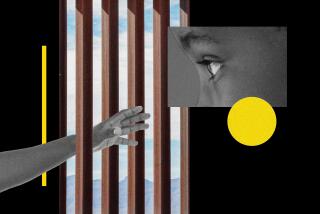Sniper unit chief tells of ordering slaying
The leader of an Army sniper team, testifying Friday as one of his soldiers went on trial for murder, said he ordered the sergeant to kill an Iraqi civilian to prevent their clandestine unit from being discovered.
Testimony by Staff Sgt. Michael A. Hensley appeared to boost the defense of Sgt. Evan Vela, the last of three snipers to face a court-martial for actions last year southwest of Baghdad. Hensley and Spc. Jorge G. Sandoval Jr. have been acquitted of murder charges but found guilty of lesser counts.
“I asked him if he was ready,” Hensley said of Vela. “I moved out of the way. I pulled the head rag over his [the Iraqi’s] head . . . and told Vela to shoot.
“I would have gladly shot him myself. If he didn’t, I would have,” he said.
Hensley said he was afraid of being discovered by Iraqi men who he thought were about 500 feet away.
He said a man, Ghani Naser Janabi, stumbled upon the snipers’ hiding place while they were sleeping.
“I put him face down on the ground, with my knee in his back. He started to make a lot of noise. He started crying, at times, he was yelling. I was trying to shut him up,” Hensley said.
After Janabi’s 17-year-old son, Mustafa, discovered them and was briefly detained by the sniper unit, Hensley said he decided he had no choice but to kill Janabi.
He described the decision on May 11 as one of many hard choices in a counterinsurgency campaign in Jarf Sakhr, 35 miles southwest of Baghdad.
“We had been losing a lot of people without doing anything,” Hensley said. “My sergeant major told me he wanted to produce more kills and I was the guy to make it happen.”
By last July, the tactics of his sniper section on May 11 and in two other instances had resulted in charges against Hensley, Vela and Sandoval.
Though acquitted of murder charges, Hensley and Sandoval were found guilty of planting weapons on bodies. Sandoval also was convicted of making a false statement and Hensley was found guilty of insubordination.
Vela had testified with immunity in their trials.
The Multi-National Division-Central, under Maj. Gen. Rick Lynch, had initially refused to grant Hensley and Sandoval immunity to testify at Vela’s trial, but the ruling was overturned by a military judge.
Hensley said he had planted an AK-47 assault rifle on the body after Vela had shot Janabi, which he described as a common procedure.
James Culp, Vela’s civilian defense attorney, said this was the third case he had been involved with in which soldiers had planted weapons on bodies to boost their cases for “kills” in Iraq.
Vela, whose lawyers say suffers from post-traumatic stress disorder, listened passively to the testimony. He had broken down on the stand at Sandoval’s trial, describing how Hensley had commanded him to shoot Janabi. But at Hensley’s trial, Vela said he could not recall anything other than firing his pistol.
Janabi’s son Mustafa also testified Friday. He said his father had been on his way to a water pump when he was captured. Mustafa said he had just learned that a cousin, a Sunni Muslim, had been killed by Shiite Muslim militia fighters and he had gone to find his father and tell him.
The Americans spotted him and held him at gunpoint next to his father, he said. There, he said, he delivered the bad news to his father about his cousin. His father was upset, he remembered. After an hour, the Americans ordered Mustafa to leave.
“The rest of the U.S. Army is different,” he said Friday. “These are bad men.”
Culp argued that his client and the other soldiers had been pushed to the edge.
“They have no super powers when pushed beyond human ability to absorb sleep deprivation, heat exhaustion and post-traumatic stress disorder,” he said. “You can expect bad judgment.”
--
More to Read
Start your day right
Sign up for Essential California for news, features and recommendations from the L.A. Times and beyond in your inbox six days a week.
You may occasionally receive promotional content from the Los Angeles Times.






